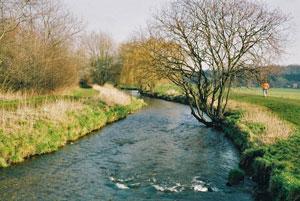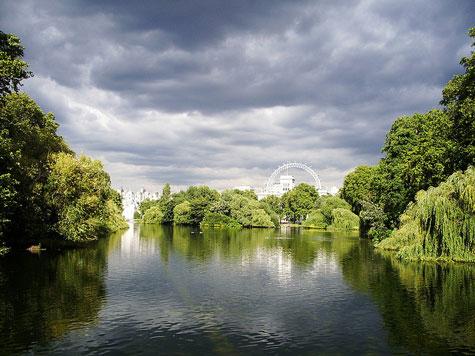Across our country and around the world, national parks come in a variety of styles, shapes and sizes. They may be large or small, urban or remote, natural areas or historical sites, but few bear any similarity to one that was proposed last week. This potential national park would cover 579 square miles, include 170 museums, and be home to 1,500 species of flowering plants, 300 species of birds...and eight million people. It's certainly not another Yellowstone.
If you log onto the website for the Greater London National Park*, you'll learn that * after the name indicates it's currently a "Notional Park"...but proponents of the "notion" seem to have a well-organized campaign... and some interesting arguments for their cause.
Daniel Raven-Ellison, who is credited with the idea for the Greater London National Park, describes himself as "a Londoner, guerrilla geographer, alternative adventurer and a National Geographic Emerging Explorer." He says the concept developed after he visited all 15 of the UK's current National Parks with his son.
In a press release launching the proposal last week, Raven-Ellison said his idea is consistent with the philosophy of other national parks in ther country.
"According to National Parks UK," Raven-Ellison noted, "the purpose of a national park is to 'conserve and enhance natural beauty, wildlife and cultural heritage, and to promote opportunities for the understanding and enjoyment of the special qualities of national parks by the public.'"
"If these objectives are central to the notion of a national park," Raven-Ellison asks, "why shouldn't London, with all its green space, cultural heritage and diverse wildlife, be one too? "
"To be clear," he continues, "I am not calling for London to be given a legal national park designation. But I do think there would be great value and benefits if London was named as a new kind of national park ' an urban national park."
It's certainly true the term "national park" covers a wide range of sites around the world, but what resources are available in a city of this size to support the proposal? Many of us, including quite a few London residents, might be surprised.
"London is an incredibly diverse place," proponents of the park explain. "8.3 million humans speaking 300 languages share the city with 13,000 wild species as well as lots of cats and dogs. You may be excused to think there was not much space for all these Londoners, but 60 percent of London is open land and 47 percent of Greater London is green."
"As well as the 3,000 parks, 142 local nature reserves, 36 sites of special scientific interest, 4 UNESCO World Heritage Sites and 2 National Nature Reserves within the city's limits, there are 3.8 million private gardens. For its size, London is one of the very greenest cities in the world."
Looking for a place for a casual walk or a long-distance hike? London has hundreds of miles of paths and trails, including the London Outer Orbital Path (LOOP) that runs for over 150 miles, and "the Green Chain, a 50-mile walk that takes in dozens of woods, parks, Crystal Palace and the magnificent Thames Barrier."
Interested in history? Greater London includes the Palace of Westminster, Maritime Greenwich, the Tower of London, the Royal Botanic Gardens and "thousands of museums, galleries and open houses that allow residents and visitors to explore the Greater London National Park's* deep, complex and rich history."
It's not entirely clear what type of organization, staff and funding would be required to convert this notion into reality, but the supporter's website offers a number of ways to move the idea along. If a similar concept were to be proposed in the U.S.A., one of the first objections raised by some would be fears of a "government takeover" of local or private institutions, so park proponents are trying to allay those concerns.
"This is not a proposal to change planning policy in the capital," supporters say. "The Greater London National Park would not have the planning powers that so many residents in current National Parks dislike. Nor would it replace the thousands of organisations who are already doing incredible work across the capital."
"The Greater London National Park would be a new kind of park, an 'urban' national park that would aim to conserve London's awesome ability to be dynamic, innovate and evolve. The Park's leadership role would be to inform and inspire best practice, help to better co-ordinate and promote London's biodiversity and recreational opportunities."

Part of the London Outer Orbital Path runs through open fields along the River Cray. Photo from Wikimedia Commons.
"My hope is that the Greater London National Park idea will act as a lens through which planners, designers, architects, recreation managers, wildlife coordinators, teachers, parents and children could reimagine the city of the future," Raven-Ellison said. "If the park makes the transition from being a 'notional park' to a national park it would also help to coordinate some of the thousands of organisations and initiatives that are spread across London's cultural and ecological mosaic."
'How would being a National Park change the way we live, work and play in the city? How would we educate children, design buildings, plan health services or create new leisure activities differently if we started thinking of London as a National Park?' Raven-Ellison asks.
The idea of urban parks isn't new for America's national park system, although the U.S. versions follow the more traditional model, transplanted to city settings. There has been some discussion recently about how to make America's national parks more "relevant" in today's world, and organizers of the London idea promote that concept.
According to the proposal's website, "The Greater London National Park* is here for everyone to enjoy. The Park* is highly inclusive, with many people who could not usually afford to visit National Parks living within our boundaries."
Those are noble goals, so even though most of our readers in the U. S. won't have a big stake in the outcome, it would be interesting to know what you think about the plan. Is this is a valid approach for introducing more people, especially those who live in the city, to the concept of a "national park"... or would the absence of a clearly defined park in the traditional sense ultimately dilute the "national park brand"?



 Support Essential Coverage of Essential Places
Support Essential Coverage of Essential Places






